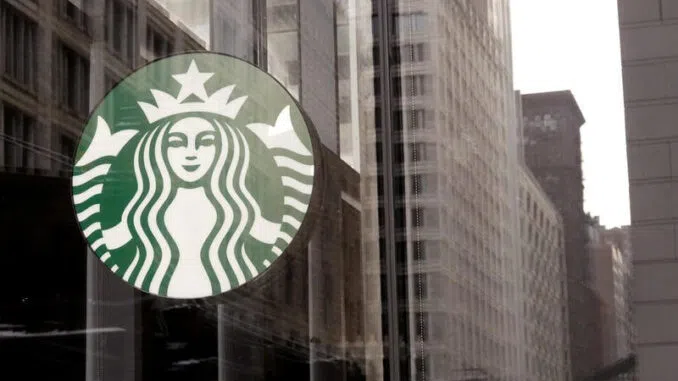

Starbucks has been hit with a $25 million damages verdict after firing a former regional manager who alleged racial discrimination. Learn about the controversial case that unfolded in the aftermath of the Philadelphia arrests and the impact it had on the coffee giant.
Starbucks, the renowned coffeehouse chain, has recently made headlines as a federal jury ordered the company to pay more than $25 million in damages to a former regional manager. The ex-employee claimed that her termination was motivated by racial discrimination, particularly because she was white. The incident traces back to the highly publicized arrest of two Black men at a Philadelphia branch, which sparked nationwide outrage and protest. This blog article delves into the details of the case, exploring the events that transpired and the subsequent verdict.
The Rittenhouse Square Episode and its Aftermath
In April 2018, an incident unfolded at a Starbucks store in Philadelphia's Rittenhouse Square neighborhood. Two Black men arrived at the shop for a business meeting with a white individual who had yet to arrive. As they waited, one of the men asked to use the bathroom but was denied permission. Eventually, they were asked to leave, and when they refused, an employee called the police. The arrests that followed were captured on videos that quickly went viral, fueling accusations of racism, widespread protests, and threats of boycotts. Starbucks' CEO publicly apologized, condemning the mistreatment of the two men as "reprehensible." In an unprecedented move, the company temporarily shut down 8,000 stores for racial bias training.
The Termination of Shannon Phillips and the Lawsuit
Former regional manager Shannon Phillips, a white employee at Starbucks, found herself at the center of the controversy. In a surprising turn of events, a federal jury in New Jersey ruled in her favor, determining that Starbucks had wrongfully fired her due to the fallout from the Rittenhouse Square incident. The jury found that the company had violated federal civil rights laws and a New Jersey law prohibiting racial discrimination. Consequently, Phillips was awarded $600,000 in compensatory damages and an additional $25 million in punitive damages.
Phillips' Claims of Targeted Punishment
Phillips alleged that Starbucks, as part of its damage-control efforts following the arrests, aimed to penalize her and other white employees in the Philadelphia region, even if they were not involved in the incident. She asserted that she wholeheartedly supported the company's attempts to restore its reputation and had actively sought to assist hourly workers. This included organizing managers to cover store shifts and provide support to employees who felt intimidated by protesters.
Discrepancies in Treatment
In her lawsuit, Phillips claimed that a Black female superior instructed her to suspend a white manager who oversaw Philadelphia stores, although not the one in Rittenhouse Square. She believed the allegations of discriminatory conduct against the white manager to be unfounded. Surprisingly, no action was taken against the Black manager who oversaw the Rittenhouse Square store, despite allegations that he had promoted the employee who contacted the police.
Jury's Ruling and Damages Awarded
The federal jury in New Jersey unanimously supported Phillips' claims and concluded that Starbucks had terminated her employment due to her race. The punitive damages awarded reflect the severity of the violation, totaling an unprecedented $25 million. This landmark verdict reinforces the importance of upholding civil rights and combating racial discrimination in the workplace.
Starbucks' Counterarguments
Starbucks, in its court filings, vehemently denied that Phillips had been fired based on her race. The company contended that her termination resulted from poor performance in response to the incident that led to the Philadelphia arrests. According to Starbucks' legal representation, they needed a leader who could effectively handle the crisis, and Phillips allegedly failed to meet those expectations.
Conclusion:
The recent jury ruling against Starbucks, ordering the payment of $25 million in damages to former regional manager Shannon Phillips, sheds light on the complex issue of racial discrimination in the workplace. This case, which emerged from the aftermath of the Philadelphia arrests of two Black men, raises important questions about fairness, equality, and corporate responsibility. As Starbucks faces the consequences of this controversial verdict, it serves as a reminder that all individuals should be treated with respect and that justice should prevail, regardless of their race or ethnicity.
Is this content hitting the mark for you? If so, consider supporting my work—buy me a virtual coffee! ☕ Your support keeps the ideas flowing. Thanks so much! 🙏 Please Contribute via GoGetFunding
Gold prices reached an all-time high on Thursday, surpassing $3,000 per ounce, as investors, alarmed…
The ongoing negotiations between the US and Ukraine regarding a minerals deal have hit a…
Fitness expert Jillian Michaels is leading the charge for a massive overhaul of the American…
Russia has officially presented a set of peace demands to the United States in an…
In a bold new tax reform proposal, President Donald Trump is advocating for a significant…
A chilling incident recently unfolded on the streets of Britain, highlighting the growing concern over…